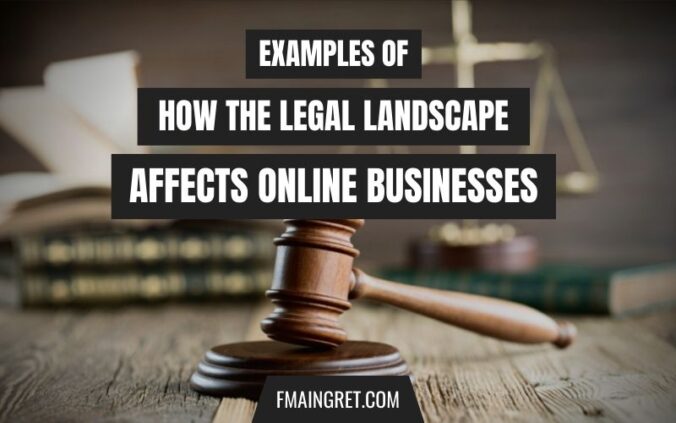Remember when the ecommerce world was the Wild West? Back in the early 2000s, when companies could collect any data they wanted, and there were little standards for online transaction security. Times have changed, but threats are still there, and we now see new regulations every day. Authorities and regulators must ensure that consumers are protected, and the business environment is fair for all its actors. You can hear about it in the daily news. The Federal Trade Commission is going after Amazon, the Indonesian government is taking action against social media, etc. The legal environment has a massive impact on competitive dynamics, and it is important that entrepreneurs understand the current regulations where they operate.
Indeed, regulations vary depending on the country, and it is a highly complex subject. It is, of course, impossible to go into great detail about how regulations affect businesses. The aim of this section is to list a few examples of regulations that apply to ecommerce that can impact strategic decisions. There are more types of laws, like Contractual Relationships, Labor Laws, Tax Laws, etc. I recommend any entrepreneur knows at least the basics of what regulations impact their businesses. It can help avoid being sued, but also to know how to protect a business from malicious actions from competitors and scammers.
Antitrust laws
Regulators are constantly attempting to ensure businesses can operate in a fair, competitive environment. Antitrust laws can help prevent the formation of monopolies or oligopolies, where a single company or a small group of companies dominate a market. These situations tend to limit innovation and may cause higher prices for consumers. Antitrust laws typically look at mergers and acquisitions that might substantially lessen competition and price-fixing collusion among competitors. Generally, regulators want to ensure any given person actor can’t abuse its dominant position in a market.
These situations affect anyone: the largest players in a market, consumers, and even small businesses. A good example is the Federal Trade Commission (FTC) against Amazon. Amazon allegedly uses its algorithm to limit its third-party sellers’ ability to lower prices on other online channels. This causes higher prices for consumers, as fewer good deals are available off-Amazon. At the time of writing this section, it is not certain what Amazon will do, but some actions may impact the way third-party sellers do business, including millions of small companies.
Consumer protection
Have you ever tried to order concert tickets online? You find a good deal on two tickets for your favorite artist. Then, when you go to checkout, you get hit with a service fee. Once you’re about to hit the “Place order” button, you also see a convenience fee and a delivery fee. In reality, the price after all fees and taxes is much higher than what you saw initially. This misleading pricing strategy, known as “drip pricing,” is banned in some countries under consumer protection laws.
Consumer protection laws aim to protect the rights and interests of online shoppers. For example, they may state that businesses must disclose all costs, fees, and taxes associated with a purchase. They also mandate that businesses must clearly display their returns and refund policy. It is a huge deal in ecommerce, as we’ve all been disappointed (or even scammed) upon receiving a product ordered online. Online businesses are also often required to comply with data protection laws, like the General Data Protection Regulation (GDPR) in the European Union or the California Consumer Privacy Act (CCPA) in the United States. These laws regulate the collection and use of customer data.
As you can see, there are many areas of ecommerce where customer protection law can apply. It is important for entrepreneurs to comply with them, not only because it is a legal obligation but also because not doing so may impact the shopping experience negatively. Getting returning customers is particularly important for success, and being seen as a predatory business can cause a business’ reputation to worsen.
Cybersecurity
Any online transaction involves risk. Scammers operating online will devise very elaborate tactics to steal credit card info or other data. We mentioned data protection law above, but there are even more strict processes in some cases. For example, the Health Insurance Portability and Accountability Act (HIPAA) in the United States requires ecommerce platforms handling health data to implement significantly strict security measures to protect sensitive patient information. E-signature laws, like the Electronic Signatures in Global and National Commerce (ESIGN) Act in the United States, enable the use of electronic signatures for online contracts, facilitating some types of ecommerce transactions.
Regarding credit card information and information transmissions, strict standards are in place. PCI DSS is a set of security standards for organizations that handle credit card payments. Compliance with these standards is mandatory for ecommerce businesses to protect customer payment data. Ecommerce platforms must also use SSL/TLS protocols to encrypt sensitive customer information, such as credit card details, during online transactions, preventing interception by malicious actors.
Data breaches, a type of security incident that results in unauthorized access to private information, are more frequent and sophisticated. Many jurisdictions have mandated that businesses victim of data breaches notify their customers. Not complying with these laws can harm a business’s reputation, but they can also face fines, penalties, or legal action.
Intellectual Property
When selling physical products, whether online or in brick-and-mortar stores, companies must be aware of IP (Intellectual Property) laws. Of course, you can’t just duplicate your competitors’ products and cut the price. Many products and technologies are patented, and selling counterfeits would expose you to legal action from competitors.
However, it is important to understand that IP laws also apply to non-physical assets. Trademark laws protect brand names, logos, and symbols. Ecommerce businesses rely on trademarks to establish their brand identity and distinguish themselves in the online marketplace. Copyright laws protect original content, such as images, videos, music, and written materials. This way, you can’t just copy and paste competitors’ materials and use them in your product pages without authorization. Even online processes can be patented. For example, Amazon’s “one-click” process was once patented (it expired in 2017), protecting its easy online ordering process.
IP law is highly complex, but it is important for ecommerce entrepreneurs to understand what they can and can’t do. Knowing about it also helps fight competitors who may violate some IP laws and threaten your business. Ecommerce businesses also often engage in IP licensing and agreements to use third-party IP or license their own IP to others, leading to profitable business opportunities. Understanding IP law is crucial when crafting such deals.
Conclusion
In the dynamic and exciting world of ecommerce, laws and regulations continuously change the competitive environment. We see new threats every day, but also new ways to fight them. Regulatory frameworks, from antitrust laws to data protection mandates, help ensure a fair and trustworthy market for both businesses and consumers. It is, however, important to understand how these regulations change and impact your business to be better protected and not expose yourself to a lawsuit.

